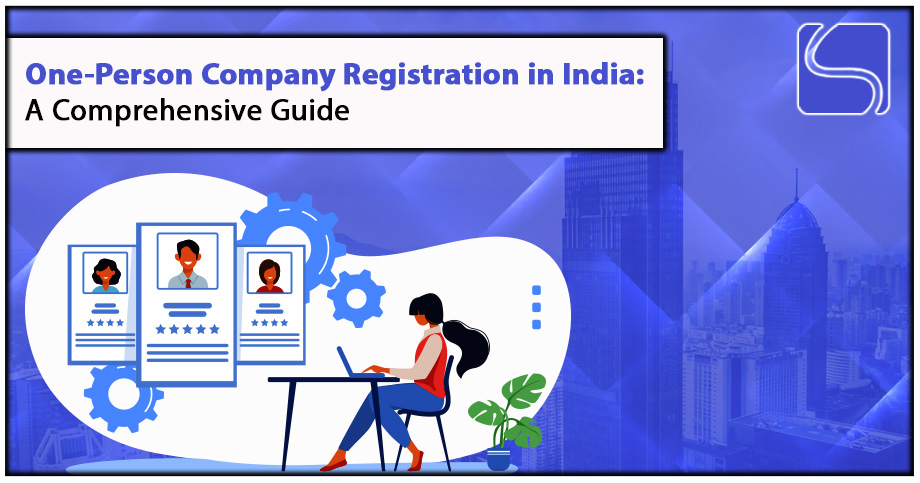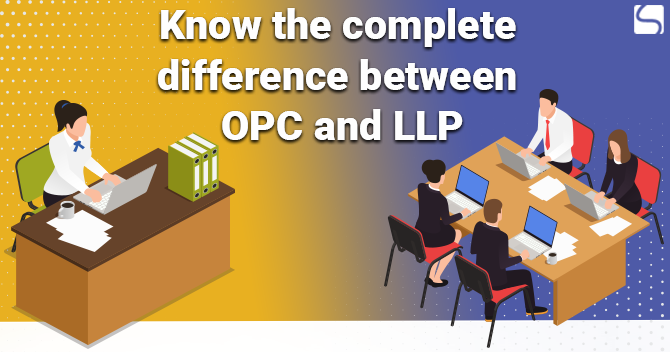One Person Company Registration in India: A Comprehensive Guide

Shivam Narwal | Updated: Apr 21, 2023 | Category: One Person Company
Starting a business in India can be a challenging task, especially for individuals who want to venture out on their own. However, the One Person Company (OPC) registration provides a viable solution for solo entrepreneurs looking to establish their business in India. This type of company was introduced under the Companies Act 2013 to promote entrepreneurship and provide a legal framework for individuals to start their businesses.
The One Person Company (OPC) is a type of company that has only one person as its member and director, offering limited liability protection to its member. This means that the personal assets of the member are separate from the assets of the company, providing a safety net for individuals who may face legal or financial issues. The OPC also offers several advantages to solo entrepreneurs, including easy management and control, no minimum capital requirement, and tax benefits. However, individuals must meet certain eligibility criteria and provide the necessary documents to register their OPC with the Ministry of Corporate Affairs (MCA)[1]. After registration, there are certain compliance requirements that must be followed to maintain the OPC’s legal status. In this comprehensive guide, we will discuss the OPC registration process in detail, including eligibility criteria, required documents, registration procedure, and compliance requirements, to help individuals establish their business in India with ease.
What is a One Person Company (OPC)?
A One Person Company is a type of company that has only one person as its member and director. It was introduced in the Companies Act 2013 to encourage entrepreneurship and provide a legal framework for individuals to start their businesses.
An OPC can be registered as a private limited company or a limited liability partnership (LLP). It provides limited liability protection to its members, which means that the personal assets of the member are separate from the assets of the company. In case the company faces any legal or financial issues, the personal assets of the member will not be at risk.
Advantages of One Person Company (OPC)
One Person Company registration has numerous advantages for solo entrepreneurs, some of which are mentioned below:
- Limited Liability Protection: OPC provides limited liability protection to its members, which means that the personal assets of the member are separate from the assets of the company. In case of any legal or financial issues, the personal assets of the member will not be at risk.
- Easy to Manage: An OPC can be managed by a single person, which makes it easy to manage and operate. The member has complete control over the company, which allows them to make quick and effective decisions.
- No Minimum Capital Requirement: Unlike other types of companies, OPC does not have a minimum capital requirement, which makes it easy for individuals to start their businesses.
- Tax Benefits: OPCs are taxed at the same rate as private limited companies, which is lower than the tax rate for individuals.
Eligibility Criteria for One Person Company (OPC)
To be eligible for OPC registration, an individual must meet the following criteria:
- Only Indian citizens and residents are eligible to register an OPC.
- The member of an OPC must be a natural person and cannot be a company or any other legal entity.
- An individual can only register one OPC at a time.
- The member of an OPC must appoint a nominee who will take over the company in case of the member’s death or incapacity.
Table of Contents
Documents Required for One Person Company (OPC) Registration
The following documents are required for OPC registration:
- Identity proof of the member and nominee: PAN card, passport, or voter ID card.
- Address proof of the member and nominee: Aadhar card, passport, or utility bill.
- Proof of registered office address: rental agreement, property deed, or electricity bill.
- Memorandum of Association (MOA) and Articles of Association (AOA): These documents outline the company’s objectives, rules, and regulations.
- Consent of nominee: The nominee must give his/her consent to act as the nominee in case of the member’s death or incapacity.
Procedure for One Person Company (OPC) Registration
The procedure for OPC registration is as follows:
Obtain Digital Signature Certificate (DSC): The member must obtain a DSC from a certified agency. The DSC is required for the online filing of documents.
Obtain Director Identification Number (DIN): The member must apply for a DIN by applying to the Ministry of Corporate Affairs (MCA).
Name Approval: The member must select a unique name for the OPC and submit it to the MCA for approval.
Filing of Documents: After the name is approved, the member must file the following documents with the MCA:
- Memorandum of Association (MOA) and Articles of Association (AOA): These documents outline the company’s objectives, rules, and regulations.
- Consent of nominee: The nominee must give his/her consent to act as the nominee in case of the member’s death or incapacity.
- Declaration by the member: The member must declare that he/she is the only member of the company.
- Registered office proof: The member must submit proof of the registered office address.
Payment of Fees: The member must pay the required fees for the registration process.
Issuance of Certificate of Incorporation: Once all the documents are filed and fees are paid, the MCA will issue a Certificate of Incorporation. This certificate confirms the registration of the OPC.
PAN and TAN Application: The member must apply for Permanent Account Number (PAN) and Tax Deduction and Collection Account Number (TAN) for the OPC.
Compliance Requirements for One Person Company (OPC)
After the OPC is registered, there are certain compliance requirements that the member must follow:
- Appointment of Auditor: The member must appoint an auditor within 30 days of incorporation.
- Annual Compliance: The member must file annual returns and financial statements with the Registrar of Companies (ROC) within the specified time period.
- Board Meetings: The member must hold at least one board meeting in each half of the calendar year, with a gap of at least 90 days between them.
- Tax Compliance: The member must comply with all tax-related requirements, such as filing income tax returns and paying taxes.
Conclusion
The concept of One Person Company (OPC) registration in India has made it easier for solo entrepreneurs to start their businesses with limited liability protection and easy management. The registration process involves fulfilling certain eligibility criteria and submitting necessary documents to the Ministry of Corporate Affairs (MCA). Once registered, the OPC must comply with certain requirements, such as appointing an auditor, filing annual returns and financial statements, holding board meetings, and complying with tax-related requirements.OPC provides a great opportunity for solo entrepreneurs to start their businesses without the need for a co-founder or partner.














